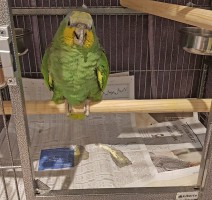The Parrot Society UK
When should I take my bird to a Vet?
Obviously we all want to keep happy, healthy birds, that will live out their full life span with no disease problems. However, in reality, accident and illness will occur, and then the best person to help out is an experienced avian veterinarian. The majority of parrots are prey species, and as such are very good at masking signs of illness until the bitter end - in their natural environment, any individual looking subdued, sleepy or weak will quickly be caught by a predator, or even attacked by its companions. Many veterinary surgeons hear from clients that "the bird was fine until today", only to find that the bird had actually been showing signs that were not recognised by the owner, or that the problem had remained invisible until the patient could hold out no longer.
It is therefore very important to get to know your bird and its normal behaviour patterns. Any subtle change in attitude, voice, activity, eating or drinking routine could indicate a problem. Certainly more obvious signs like a change in the colour or consistency of droppings, discharge from nostrils or eyes, vomiting or wheezing should be immediate calls for alarm. Urgent action would be required for any of the following:
- Unconsciousness
- Bleeding
- Broken bones
- Appearing listless & weak
- Sitting with feathers fluffed up
- Vomiting
- Not eating or drinking
Be Prepared Because you will need to act quickly if your parrot does get ill, that is not the time to be hunting around for veterinary assistance. Find out in advance veterinary practices with avian expertise near you - see Avian Vets for a UK listing by county. When you acquire a new bird, it is a good idea to get it checked over by an avian vet, who can advise on husbandry and diet, as well as checking for latent disease problems, and perhaps also sexing and microchipping the bird. This examination will make an introduction, and get you and your bird established with a veterinary practice, as well as providing the opportunity for some baseline information, which could be valuable if things change in the future. Many parrot owners will take their birds for a routine annual check-up, just as you would a dog or cat.

"As sick as a parrot" - Orange-winged Amazon sitting hunched up, feathers fluffed, not eating, and with wet droppings
Definitely what you should not do is to rely on a search of the internet for advice, or to try remedies suggested by acquaintances, pet stores, or on-line companies. Parrots display a limited number of signs of illness, yet diarrhoea for example could have a dozen possible causes. Each of those causes would require different treatment regimes, so what may work in one case would be useless in another. A parrot-owner once contacted me about her African Grey parrot that had been passing very wet droppings for SIX MONTHS! She had spent time surfing the web for information, and as a result of her findings had changed the bird’s diet on several occasions, with no effect. Then she decided that all the information gathered pointed to kidney or liver disease, so e-mailed to ask me what she should do next! The likely diagnosis of kidney or liver disease is high on the list, but it could also be diabetes, chronic bowel damage, parasitism, etc. The point here is that she has wasted a lot of time gathering advice that may or may not have been helpful, when she could have had the problem accurately diagnosed and properly treated if she had consulted an avian vet in the first place. An experienced veterinarian will use a combination of a physical examination and diagnostic tests, including blood or faecal sampling, radiography, endoscopy, and even ultrasound or scans.
Such ‘suck it and see’ medicine in the above example is potentially disastrous, especially if involving respiratory signs. Whilst birds can suffer from chronic, long-term respiratory problems, the majority are acute and serious, and require prompt attention. Fungal diseases such as Aspergillosis, once they get a good hold on the bird, can be virtually impossible to cure, so early diagnosis and correct treatment is vital. It is important not to try one remedy after another to see which works best. Be very careful about what you read on the world wide web – it may be right, partially correct, or very, very wrong!
Be alert to your parrot's normal behaviour, and - "If in doubt, check it out".
See also - As Sick as a Parrot
Alan K Jones BVetMed MRCVS March 2019
